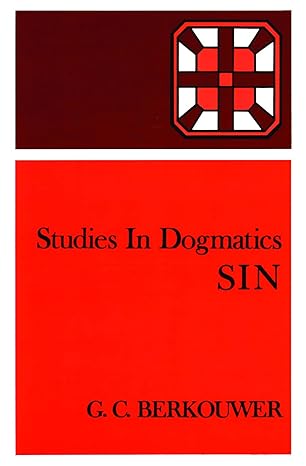A Brief Book Summary from Books At a Glance
by Steve West
Table of Contents
Part I The Origin and Knowledge of Sin
1 The Question of Origin
2 The Biblical A Priori
3 Dualism
4 Sin and the Demonic Realm
5 The Riddle of Sin
6 Sin and the Law
7 Sin and the Gospel
Part II The Essence and Spread of Sin
8 The Question of Essence
9 The Gravity and Graduation of Sin
10 The Sin Against the Holy Spirit
11 Sin, Wrath, and Forgiveness
12 The Problem of an Alien Guilt
13 Realism
14 Federalism
15 The Confession of Guilt
16 The Divine Indictment
17 The End of Sin
Summary
Part One: The Origin and Knowledge of Sin
When we look at the wickedness and suffering in the world, we cannot help but reflect on the origin of evil. Answers will vary depending on how one understands evil—if it is sin against a holy God, its origins are different than if it is something else. Sin is not related to being, but to being’s corruption. Its origin has a qualitatively different character than anything in creation. Because we are guilty of sin, any detached approach to the origin of evil will lead to excuse-making for ourselves and blaming others. We cannot trace a causal chain backwards to excuse our own evil; in the end, God alone existed, and he is good. At one level the origin of sin is irrational and cannot be logically analyzed. At another level, the origin and source of our sin is ourselves: we do not explain our sin, we confess it. We do not sin because of fate or coercion. Some blame others, and some even blasphemously blame God. Our hearts are the wellspring of sin; the origin of our sin is our heart, so there is no self-justification. In the end, the ultimate origin of sin is inexplicable and it is impossible for us to explain it.
The biblical a priori is that God is holy, righteous, and good. He cannot be the ultimate origin or source of sin. This is a religious position, and it is vital to maintain that God is not the cause of our sin. Difficult questions have arisen, however, about the relation of sin to the will of God. The church’s confessions maintain that ascribing sin to God or making him the author of sin is blasphemy, yet he is still in sovereign control of all things. Jesus himself is the one who guarantees to us that there is no sin or darkness in God. The message, “God is light and in him is no darkness at all” (1 John 1:5) is a key message that is supported all through the canon. Both Testaments insist that there is no sin in God, and that man has only himself to blame for his sin. God is said to hate sin and find it an abomination. God’s absolute holiness means he is too pure to have fellowship with sin. The wrath and judgment of God reveals how repugnant sin is to him.
It is the horrible nature of sin which shows us most clearly the depths of God’s grace. At the cross where the Son is forsaken, we see God’s view of sin as he pours out his wrath against it. The cross is also the place where we see that human beings are responsible for their sin and wickedness, but that God—who is not the author of sin—is still in control of all that occurs and employs man’s sinful acts to accomplish his good and holy purposes. Man is accursed and guilty, and God’s love is seen at the cross in his work of reconciliation. God intercepts man’s sin and uses it for his good purposes, but he is never the origin or cause of sin. God is the origin of all things visible and invisible, but sin is not part of this created reality: it is the destruction of reality. It is on the “reality” of sin that the idea of causality turns—sin is not a substance and yet it exists. Bavinck was right that we do not know what sin is, yet it exists. It is not part of creaturely reality, yet it manifests itself in reality. It exists but has no right to exist. . . .
[To continue reading this summary, please see below....]The remainder of this article is premium content. Become a member to continue reading.
Already have an account? Sign In
